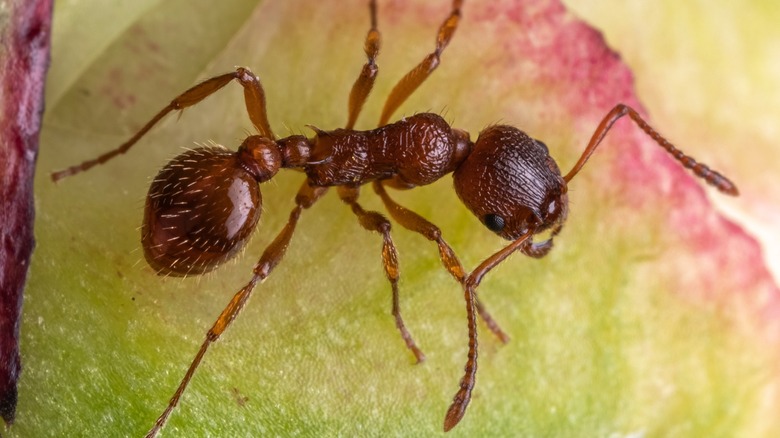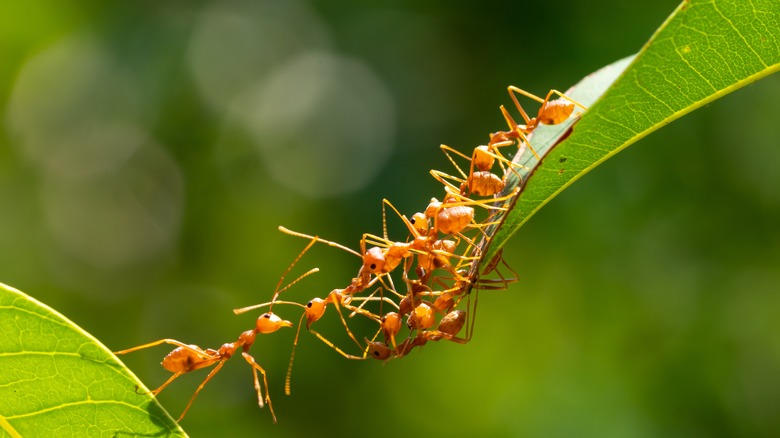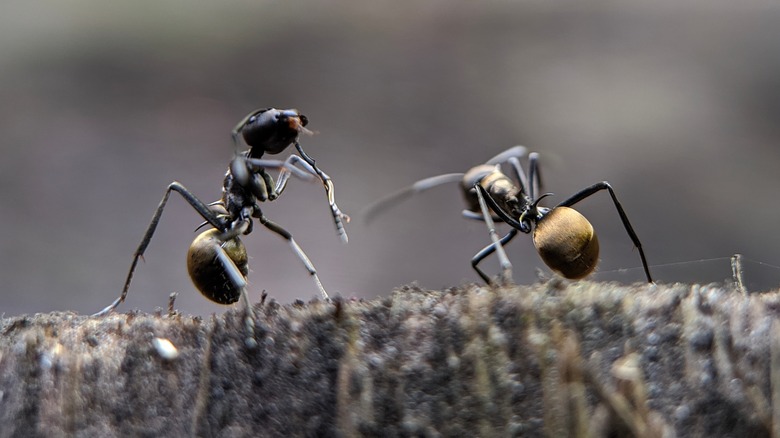What Would Happen If Ants Went Extinct?
Typically speaking, we don't tend to like creepy-crawlies. In October 2022, Metro declared that autumn was spider season in the U.K. The site offered up various suggestions on keeping the eight-legged critters out of homes, including drawing chalk boundaries (spiders are loath to cross them, it seems) and vigilant removal of cobwebs. The thing about this is, spiders tend to be harmless pest-removers (though some species certainly don't adhere to this, as any arachnophobe will tell you). They're often just looking for a warm place to mate, but this is all less of a factor when they encroach on our homes.
What have spiders ever done for us, you might think, beyond scaring the heck out of us by slowly descending on a web right in front of our faces. The creatures are truly misunderstood, as are ants. Many an al fresco dining situation has been ruined by hungry ants, so, similarly, they are public picnic enemy number one.
These tiny creatures, however, have an impact on the natural world far larger than their diminutive size would suggest. Where would we be without ants? Nowhere at all, it seems.
Tiny but mighty
Ants are fascinating creatures. They can build long, elaborate tunnels, and cooperate to accomplish extraordinary tasks. In January of 2002, Guinness World Records declared that the world's largest ant colony is comprised of an Argentine ant species, and it's 3,700 miles (6,000 kilometers) long. It passes through Spain, France and Italy, according to Guinness, and there may even be ants related to the group on the other side of the Atlantic Ocean.
The 2013 study "Backtracking behaviour in lost ants: an additional strategy in their navigational toolkit," from Antoine Wystrach et al (via The Royal Society Publishing), reached some intriguing conclusions. "M. bagoti ants foraging along a familiar route and displaced to unfamiliar terrain do not simply engage in a systematic search, but use a well-adapted strategy to head first in a direction that increases the chance of returning to familiar terrain," the scientists report. By so doing, the smart little ants have a greater chance of bringing that all-important food back to the nest.
Ants, then, are surprisingly adept at feeding themselves. That's all very well, but they also have a vital ecological role. They certainly don't only keep themselves alive.
Carrying the weight of the food web on their backs
Without ants, for one thing, the many species that feed on them would be doomed. These include the anteater, naturally, as well as the antlion. The larva of the latter insect makes cunning traps in the sand for its ant prey to fall into, then uses its hollow jaws to drain the ant bodies, according to National Geographic. That's just a tiny fraction of the natural world that would fall apart without ants, too.
The Royal Horticultural Society explains that the nest-building of ants can be an issue in backyards, and that they can protect against pests like aphids (as they feed on the honeydew the critters produce), potentially compounding the problem. The society advises, however, that ants are so beneficial to the ecosystem that they should largely be left alone.
We may scarcely notice the scurryings of ants, but they're hard at work for all of us. In 2011, the University of Exeter conducted a study into the impact ants have on their environment (per Science Daily). The scientists determined that ants, which furiously defend their territory and can defeat far larger interlopers by swarming them with numbers, have enormous impact on the world around them. As the University of Exeter's Dirk Sanders put it, "despite being predators, their presence can also lead to an increase in density and diversity of other animal groups. They genuinely play a key role in the local environment, having a big influence on the grassland food web."
Thanks, ants
According to the study's Frank Van Veen (via Science Daily), "the impact of ants on soil nutrient levels has a positive effect on animal groups at low levels." At the same time, the scientist goes on, the more dense the ant population, "their predatory impacts have the bigger effect — thereby counteracting the positive influence via ecosystem engineering." The ecosystem, as we know, is a very delicate balance, and ants play a huge (if not always a positive) part in it.
A Myrmecological News study from August 2008 titled "The effect of ants on soil properties and processes (Hymenoptera: Formicidae)" examines this. In a similar fashion to earthworms, ant movements below the ground are hugely beneficial for the soil. "The building of corridors and galleries ... increase[s] soil porosity and may cause separation of soil particles," the report states.
These changes revolve around "a shift of pH towards neutral and an increase in nutrient content (mostly nitrogen and phosphorus) in ant nest-affected soil." Their waste and biodegrading food, too, plays a role in the dispersal of nutrients. As the study concludes, there's much more to learn about the ants' effects on the soil of their own nests as well as outside it, and what is known differs by species. Were the world's ants to go extinct, though, plants would suffer, as would those animals that graze on them, and so on up the food chain. Per ThoughtCo, we ourselves may be reliant on ants for our survival.



